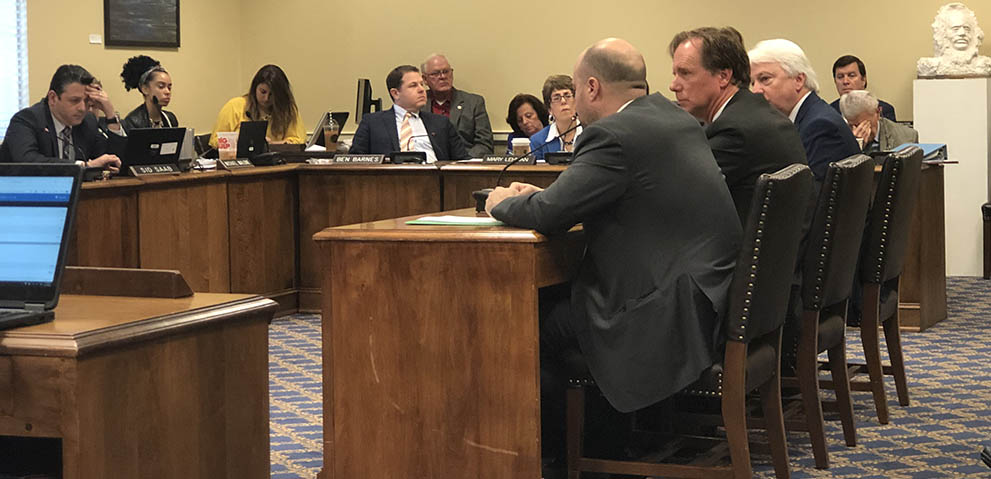ANNAPOLIS, Md. — A campaign finance bill designed to allow Anne Arundel County officials to limit contributions developers make to local races is awaiting the governor’s signature.
The measure could impact the ability of developers to donate to incumbents and challengers running for County Council and county executive seats in Anne Arundel.
House Bill 993 — if approved by Gov. Larry Hogan — would take effect July 1. Hogan has not yet indicated whether he will sign the measure, according to the governor’s spokeswoman, Shareese DeLeaver-Churchill.
The measure would grant authority to the Anne Arundel County Council to enact laws prohibiting developers from making a campaign contribution to a county council member, county executive or candidate for either body while a land use application or zoning change action is pending, according to analysis from the Department of Legislative Services.
The legislation would also allow the council to enact a law regulating these officeholders from participating in actions related to land use applications and zoning changes if they accepted contributions from the individual or business involved.
State Del. Heather Bagnall (D-District 33) led a workgroup on the bill after it was proposed by County Executive Steuart Pittman. The initial bill would have prohibited outright certain developer contributions in Anne Arundel County, but Bagnall said in a phone interview that there were concerns about the state getting involved in county affairs.
The measure, which was previously 16 pages, was amended down to nearly four.
“We wanted to make sure that we were giving the county the authority to decide how they wanted to roll out that policy, but without heavily influencing what that policy would look like,” Bagnall said.
She added, “It was actually a very smooth effort.”
Representatives of the Anne Arundel County Council said it was necessary for this measure to pass through the Generally Assembly first. Dave Helmecki, legislative aide to the chair of the Anne Arundel County Council, said in a phone interview that “all rights and powers granted to county governments have to be given by the state government.”
He added, however, “I think there’s a lot of questions that need to be answered yet before the council entertains any legislation at this time.”
Pittman said in a phone interview that he is happy with how the bill turned out even though it was amended so significantly.
“I mean, the way I see it now, we can have the conversation where it belongs, which is with the people who are going to be impacted by it,” Pittman said. “And because the state says that our local laws have to mirror theirs … that’s why we went to our delegation.”
The county executive added if a corresponding campaign finance bill is introduced by the County Council, “this is going to be controversial.
“There’s gonna be some give and take,” Pittman said. “I know that there are council members who are uncomfortable with the idea. I feel strongly that it’s a good thing for the county at this point in our history that we need. Especially when we’re in the middle of our planning process, our general development plan, there’s a real sense that developers have too much political influence.”
Pittman, who was elected county executive in November, said during a legislative hearing that he requested the bill as a result of concerns he was hearing from constituents about the amount of influence that developers have over land-use decisions. He said that both he and his Republican opponent in that race, then-County Executive Steve Schuh, accepted donations from developers, and that the point of the bill was to prevent the possibility of a “developer candidate” — a politician who could be influenced by donations from land use applicants.
Councilmember Allison Pickard, vice chairwoman of the Anne Arundel County Council, said in a phone interview that her support of the potential council bill would depend on its components.
“I know the county executive intends to put a bill forward,” Pickard said. “I feel like as a county councilperson, I would like to be collaborative in that legislation.”
Pickard added: “Obviously, the concept is popular with the electorate. Figuring out where that influence lies in the development process will be part of the debate.”
Pittman and others have said that this bill was originally modeled after a Prince George’s County measure, Senate Bill 902, enacted in 2011. It states that applicants for zoning measures or anyone acting on their behalf cannot make payments to the county executive, county council or any slate that may include them while their application is pending. The 2011 bill followed a corruption scandal involving former Prince George’s County Executive Jack Johnson, and his wife, Leslie, who served briefly on the County Council.
According to a 2011 press release from the FBI, Johnson extorted $1.6 million in bribes from developers and in turn, was performing “favorable official actions” for them, including, but not limited to, having Leslie leverage her position as a county council member.
Jack Johnson pled guilty to extortion conspiracy and evidence and witness tampering, and Leslie Johnson pled guilty to conspiracy to commit witness and evidence tampering with intent to obstruct a federal corruption investigation. Both have since been released from prison.
Meanwhile, a proposal was made to repeal pieces of the Prince George’s County law during the 2019 legislative session. The effort would have kept the restrictions on donations to the County Council in place but removed them on donations to the county executive. The measure died in the Senate.

